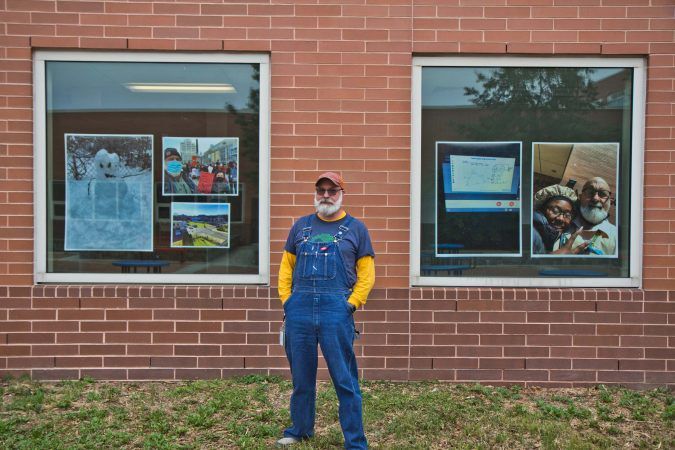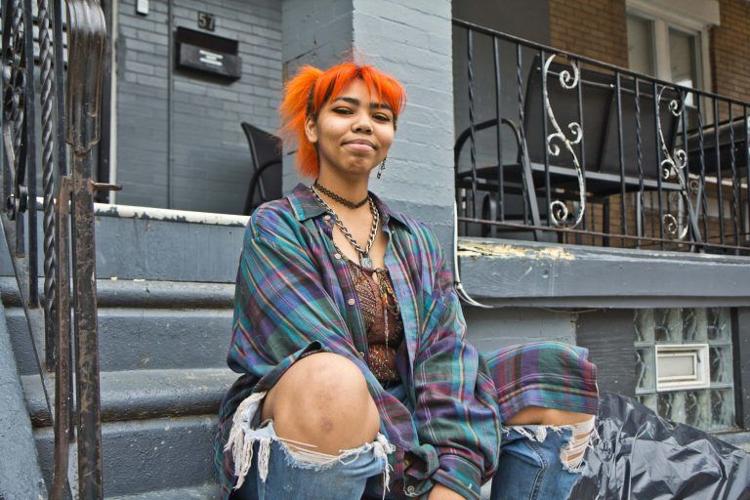At the start of the school year, Peter Coyle felt he was tasked with an impossible mission: virtually teach art to students who don’t have art supplies at home.
But the obstacles of online teaching led the West Philadelphia High School teacher toward working collaboratively with his students.
Together they created a photography exhibit, which opened last week and will run through September. The gallery, set in the school’s courtyard entrance, is open to the public.
Coyle says the project has been an opportunity for the school community to really see and hear each other again.
“We’ve spent so much time apart,” said Coyle. ”We haven’t been able to share our lives together.”
Most high schoolers in the School District of Philadelphia have been fully virtual since March 2020. On a day-to-day basis, many high school teachers say engagement with students has plummeted. Coyle has been teaching mostly to a collage of empty, black boxes on his screen. Students keep their cameras off, and he said it seems many have coiled inwards.
“Students are just … they’re done,” said Coyle, who also noted there’s been a significant drop in attendance. “They don’t have it in them.”
Coyle wanted to meet his students where they were. So he had them use an art supply they already owned: their cell phone.
He asked them to look through photos they had captured throughout the COVID-19 pandemic and choose one they would want to share with the rest of the school.
At first, they were stumped.
“They had a lot of trouble understanding [it],” said Coyle, “Almost like, ‘Well, why would someone want to see that?’”
But students came to see that they have been opening themselves up to the world — through selfies.
“A lot of kids aren’t hanging out in person, so people are sending pictures of themselves to each other,” said Coyle, “They’re just like, ‘How you doing? What’s going on?’”
He was inspired by Kyle Cassidy’s work at the Science History Institute. Cassidy, a Philadelphia-based artist, hung enlarged photographs of nurses and essential workers in the institute’s windows. The photos are exhibited with interviews with the workers as well.
So Coyle decided to pair audio stories with the photos too. Viewers can scan a QR code, download an audio file, and roam the gallery. They can look at the curated selfies hanging in the courtyard and listen to students share bits of their inner lives.
Coyle and his students worked together to come up with the interview questions, including: “Do you know anyone who got COVID? Do you know anyone that lost their job? Were you afraid of getting COVID?”
Coyle recalled another question with a laugh, “And what has happened to your TV-watching?”
The exhibit evolved into a way of giving students credit for what they’ve undergone this year, said Coyle.
“There’s been a lot of talk in the media and in education about, ‘How are we gonna deal with this learning loss?’’’ he said. “I feel like they’ve traded learning about isolation and loss and real life things that we can’t quantify.”
The school’s population is mostly Black, and he says many students had family members get sick or die from COVID-19. According to the Centers for Disease Control and Prevention, death rates from the virus in Black and Latino communities are about twice as high as the death rate in white communities.
“They’ve lived the experience of inequity,” he said.
Kelsey Craven, an 11th grader at West Philadelphia High School, is one of the students featured in the exhibit. She lost a few family members to COVID-19.
“A lot of people are just shutting themselves in right now,” said Craven. “It’s a fear response. Everyone’s hiding from what they can.”
West Philadelphia has also seen an uptick in gun violence this year. According to the City Controller’s Office, the area surrounding the high school has had a total of 95 victims of gun violence.
Craven has lost friends to the crisis. That combined with the isolation of the pandemic makes her feel alone and “trapped” sometimes.
“Everyone is just kinda disappearing, in one way or another,” said Craven.
But she has a solid outlet. ”I have a pretty damn good therapist,” said Craven.
She’s also rejuvenated by learning about her classmates through the gallery project. Even the little things make a difference. “I didn’t know half of them had cats,” she said.
Craven’s photos are mostly of her birds and a few places she’s been, like parks and other parts of the city.
In general, sending photos has been a routine way to check in with her friends. “It’s kind of our way of updating where we’ve been and that we’re still alive pretty much,” said Craven.
Craven explained, she will sometimes go through long periods of isolation. And in the context of the pandemic and the surrounding gun violence, when she posts a selfie on social media, part of her motivation is to send comfort to her friends: “Oh, at least you know she’s not dead.”
She believes the project will help rebuild a sense of school community, allowing people to hear voices and see faces they haven’t encountered in a while.
“A lot of us don’t talk anymore, but we’re all still here,” she said, then correcting herself, “most of us are still here.”










(0) comments
Welcome to the discussion.
Log In
Keep it Clean. Please avoid obscene, vulgar, lewd, racist or sexually-oriented language.
PLEASE TURN OFF YOUR CAPS LOCK.
Don't Threaten. Threats of harming another person will not be tolerated.
Be Truthful. Don't knowingly lie about anyone or anything.
Be Nice. No racism, sexism or any sort of -ism that is degrading to another person.
Be Proactive. Use the 'Report' link on each comment to let us know of abusive posts.
Share with Us. We'd love to hear eyewitness accounts, the history behind an article.